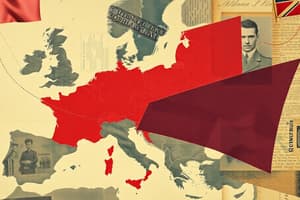Podcast
Questions and Answers
Which of the following was a significant factor in intensifying pre-WWI tensions due to economic competition and colonial disputes?
Which of the following was a significant factor in intensifying pre-WWI tensions due to economic competition and colonial disputes?
- Alliance system
- Militarism
- Imperialism (correct)
- Nationalism
How did the alliance system contribute to the escalation of WWI after the assassination of Archduke Franz Ferdinand?
How did the alliance system contribute to the escalation of WWI after the assassination of Archduke Franz Ferdinand?
- By obligating member states to defend each other, drawing more nations into the war. (correct)
- By isolating Germany and preventing it from forming alliances.
- By promoting peaceful negotiations and preventing military mobilization.
- By ensuring that the conflict remained localized between Austria-Hungary and Serbia.
What distinguished WWI from previous wars, marking a shift in military technology?
What distinguished WWI from previous wars, marking a shift in military technology?
- The reliance on traditional cavalry tactics.
- The introduction of advanced weaponry such as machine guns, poison gas, and submarines. (correct)
- The absence of naval warfare.
- The large-scale deployment of nuclear weapons.
How did WWI impact the role and rights of women in many Western countries?
How did WWI impact the role and rights of women in many Western countries?
What was the main purpose of governments utilizing propaganda during WWI?
What was the main purpose of governments utilizing propaganda during WWI?
Which of the following contributed significantly to the Russian Revolution during WWI?
Which of the following contributed significantly to the Russian Revolution during WWI?
How did the Russian Revolution impact the course of WWI?
How did the Russian Revolution impact the course of WWI?
What were the key provisions outlined in the Treaty of Versailles that aimed to address the aftermath of WWI?
What were the key provisions outlined in the Treaty of Versailles that aimed to address the aftermath of WWI?
What was the primary purpose for establishing the League of Nations after WWI?
What was the primary purpose for establishing the League of Nations after WWI?
How did nationalism contribute to the outbreak of World War I?
How did nationalism contribute to the outbreak of World War I?
Which country was NOT part of the Central Powers during World War I?
Which country was NOT part of the Central Powers during World War I?
How did the role of colonial subjects change during World War I?
How did the role of colonial subjects change during World War I?
Why were minority groups sometimes suspected of being enemies or spies during World War I?
Why were minority groups sometimes suspected of being enemies or spies during World War I?
What was a significant consequence of Russia dropping out of World War I?
What was a significant consequence of Russia dropping out of World War I?
How did the Treaty of Versailles aim to prevent future wars?
How did the Treaty of Versailles aim to prevent future wars?
Which of the following best explains how new military technologies affected the nature of combat during World War I?
Which of the following best explains how new military technologies affected the nature of combat during World War I?
How did the global involvement in World War I differ from previous major conflicts?
How did the global involvement in World War I differ from previous major conflicts?
What was a significant economic consequence imposed on Germany by the Treaty of Versailles?
What was a significant economic consequence imposed on Germany by the Treaty of Versailles?
Which of the following was a direct consequence of the redrawing of European boundaries after World War I?
Which of the following was a direct consequence of the redrawing of European boundaries after World War I?
How did the economic hardships caused by World War I contribute to the Russian Revolution?
How did the economic hardships caused by World War I contribute to the Russian Revolution?
Flashcards
MAIN causes of WWI?
MAIN causes of WWI?
Militarism, Alliances, Imperialism, and Nationalism.
Militarism in WWI
Militarism in WWI
Modernization of militaries and development of new weapons due to industrialization.
Alliances in WWI
Alliances in WWI
System of agreements requiring members to aid if another is attacked.
Imperialism in WWI
Imperialism in WWI
Signup and view all the flashcards
Nationalism in WWI
Nationalism in WWI
Signup and view all the flashcards
Central Powers
Central Powers
Signup and view all the flashcards
Which country joined later?
Which country joined later?
Signup and view all the flashcards
New Technology in WWI?
New Technology in WWI?
Signup and view all the flashcards
Global Involvement in WWI
Global Involvement in WWI
Signup and view all the flashcards
Women's Roles in WWI
Women's Roles in WWI
Signup and view all the flashcards
Children's Impact(WWI)
Children's Impact(WWI)
Signup and view all the flashcards
Minority Groups in WWI
Minority Groups in WWI
Signup and view all the flashcards
Propaganda Use in WWI
Propaganda Use in WWI
Signup and view all the flashcards
Causes of the Russian Revolution
Causes of the Russian Revolution
Signup and view all the flashcards
Impact of the Russian Revolution on WWI
Impact of the Russian Revolution on WWI
Signup and view all the flashcards
End of WWI
End of WWI
Signup and view all the flashcards
Treaty of Versailles Impact on Germany
Treaty of Versailles Impact on Germany
Signup and view all the flashcards
League of Nations
League of Nations
Signup and view all the flashcards
Study Notes
- The MAIN causes of WWI were Militarism, Alliances, Imperialism, and Nationalism
Militarism
- Industrialization led to the modernization of European militaries.
- New weapons were developed.
Alliances
- Europe was connected through a system of alliances.
- Members were required to aid each other in case of an attack.
Imperialism
- Economics was a primary motivator for imperialism.
- Competition for trade and colonies strained relations.
Nationalism
- Many European nations developed strong nationalist sentiments.
Countries Involved
- Germany, Austria-Hungary, Ottoman Empire, and Bulgaria were involved in WWI.
- The United States joined later.
Differences from Previous Wars
- WWI saw the introduction of modern weapons like machine guns, poison gas, and u-boats.
- WWI involved countries from all over the world.
- Soldiers from India, Australia, and Africa fought for the British Empire.
- The United States joined, becoming a powerful ally.
- WWI was more deadly, modern, and worldwide.
Impact on Civilians
- Women took on new roles in factories, farms, offices, and as nurses, gaining independence.
- Efforts to help the war helped women gain the right to vote in some countries after the war.
- Many children lost family members and faced food shortages.
- Some children had to work to support their families.
- Minority groups faced discrimination but were asked to fight or work for the war.
- African American soldiers in the U.S. military served in segregated units and were often treated unfairly.
- Some minority groups were accused of being enemies or spies.
Propaganda
- Propaganda boosted people’s spirits.
- It encouraged support and sacrifice.
- Civilians were convinced to work harder, conserve supplies, and join the army or support troops.
Russian Revolution - Causes
- Tsar Nicholas failed to address Russia’s political, economic, and social issues after the First Revolution.
- The war caused severe food shortages, inflation, and many deaths.
- Soldiers were poorly trained and lacked supplies.
- Civilians struggled to survive without enough food.
Impact of the Russian Revolution
- Russia dropped out of the war.
- Germany moved troops from the Eastern Front to the Western Front in France.
End of WWI
- The Treaty of Versailles blamed Germany for starting the war.
- Germany had to accept full responsibility, pay huge fines, lose land and colonies, and reduce its military.
- New countries were created.
- The League of Nations was created to keep peace and prevent another world war.
Studying That Suits You
Use AI to generate personalized quizzes and flashcards to suit your learning preferences.




